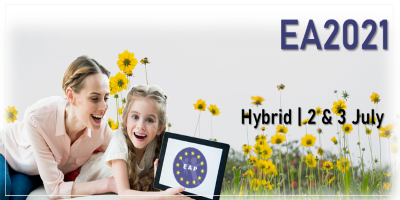July 2, 2021 @ 8:00 am – July 3, 2021 @ 5:00 pm UTC+0

This Event has passed
Registration is open!

While vaccine programmes are rolling-out around the world and we are gradually seeing the return of in-person meetings, video meetings are still an important, safe alternative right now to share knowledge and experiences. We are thankful for the technology that allows us to interact, share and connect during these challenging times.
However, Virtual meetings will never replace face-to-face interactions and we invite all of those that can travel to experience true Cyprian hospitality during the EAP Spring Meeting in Larnaca, Cyprus!
We urge you to join the EAP Spring Meeting, as staying connected is one of the best ways to support each other and still achieve our goal of improving children’s health, both in Europe and around the world.
Can I travel to Cyprus?
Visit CyprusFlightPass for more information on travel regulations
Vaccinated passengers who hold a valid vaccination certificate from the public authorities of the countries referred below, regardless of their nationality, will be able to travel to the Republic of Cyprus, from any country, without having the obligation to meet the prerequisites of the corresponding country category (e.g. RT-PCR laboratory tests, self-isolation, quarantine etc., or issuance of a special permission to enter the country).
Vaccinated passengers still have to complete, within 48 hours before their last departure flight to Cyprus, the necessary application form and obtain a CyprusFlightPass by visiting the link www.cyprusflightpass.gov.cy/en/vaccinated-fly-request.
We urge you to make sure that you read carefully through all the information here.
Primary Care Council
Chair : Dr. Zachi Grossman
Secondary & Tertiary Care Council
Chair: Prof. Berthold Koletzko
Coffee Break
EAPRASnet – Vaccination
Chairs: Dr. Stefano del Torso & Dr. Hans Jurgen Dornbusch
Adolescent Medicine
Chair: Dr. Arthur Mazur
Rare Diseases
Chair: Dr. Liesbeth Siderius & Dr. Risto Lapatto
Young EAP
Chair: Dr. Ivan Bambir
European Board of Paediatrics
Dr. Rob Ross Russell
EAP – General Assembly
Chair: Prof. Adamos Hadjipanayis
Lunch

New ways to test high-risk medical devices.
Manufacturers of medical devices need to test their products before being allowed to market them. Specifically, they require clinical data showing their medical device is safe and efficient. In this context, the EU-funded CORE-MD project will translate expert scientific and clinical evidence on study designs for evaluating high-risk medical devices into advice for EU regulators. The project will propose how new trial designs can contribute and suggest ways to aggregate real-world data from medical device registries.
It will also conduct multidisciplinary workshops to propose a hierarchy of levels of evidence from clinical investigations, as well as educational and training objectives for all stakeholders, to build expertise in regulatory science in Europe. CORE–MD will translate expert scientific and clinical evidence on study designs for evaluating high-risk medical devices into advice for EU regulators, to achieve an appropriate balance between innovation, safety, and effectiveness. A unique collaboration between medical associations, regulatory agencies, notified bodies, academic institutions, patients’ groups, and health technology assessment agencies, will systematically review methodologies for the clinical investigation of high-risk medical devices, recommend how new trial designs can contribute, and advise on methods for aggregating real-world data from medical device registries with experience from clinical practice The consortium is led by the European Society of Cardiology and the European Federation of National Associations of Orthopaedics and Traumatology, and involves all 33 specialist medical associations that are members of the Biomedical Alliance in Europe.